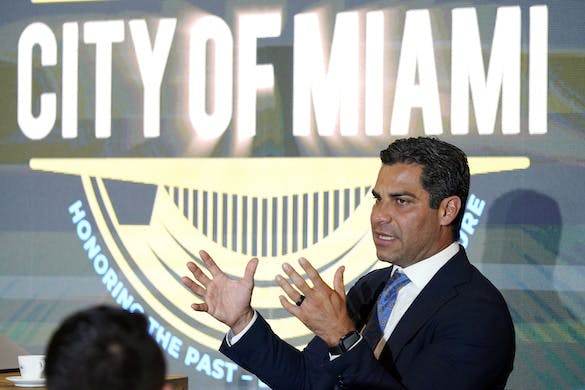States, Cities Forge Ahead With Crypto-Friendly Plans Despite Clouds Over the Industry
The state of Florida, one of crypto’s biggest boosters, is trying to keep the flame lit on a crypto boom despite the headwinds of crashing values in big name tokens like Bitcoin and Ethereum.

Despite crypto markets being in the midst of a major downturn and one of the industry’s highest profile companies lying in tatters, some states are still forging ahead in their plans to turn themselves into hubs for decentralized finance.
An analyst at the Blockchain Research Institute, Douglass Heintzman, tells the Sun that Wyoming, North Dakota, Texas, Georgia, Kentucky, Nebraska, and Idaho are plowing forward with their plans to become crypto hubs despite the clouds looming over the industry.
He says that they “would like to become the crypto center of the world, and are trying to find the right regulatory balance to not stifle innovation while mitigating risk.”
While most state legislators are happy to try to bring crypto into their state without federal influence, state legislators are looking to Congress for guidance on key legal issues like recognition of digital documents and assets and a number of privacy issues.
“My sense is that because of the interjurisdictional attributes of so many businesses, these states will look to the federal government guidance on regulation and standards,” Mr. Heintzman says. “I think they think that some clarity from the Feds would be helpful in avoiding a friction filled patchwork.”
The state of Florida, one of crypto’s biggest boosters, is trying to keep the flame lit on a crypto boom despite the headwinds of crashing values in big name tokens like Bitcoin and Ethereum.
In Miami, the Sunshine State’s crypto capital, the meltdown of the once supermassive crypt exchange FTX has resulted in the company canceling its plan to relocate its American headquarters to the city.
Now, space in what was to be the FTX building at 1450 Brickell Avenue in Miami is up for rent online, and the Miami-Dade county government is looking to pull out of a $135 million 19-year long naming rights deal for FTX Arena sports complex.
The mayor of Miami, Francis Suarez, continues to tout crypto, calling for cryptocurrencies to be “integrated into every aspect of society” at a recent CryptoPunk event.
In Miami, the divide between those cooling off on crypto and those who are waiting on the industry to moon again is local, but it’s representative of a growing divide nationally spurred on by the recent downturn.
In contrast to New York’s rejection of specialized electricity-hungry mining operations, some legislators in Wyoming have moved to incentivize crypto mining by carving out regulatory exemptions around commercial electric rates. One bill would create industrial power zones where crypto miners would be exempt from state regulations on the price of electricity for commercial use.
Another proposal would allow utility companies to strike direct deals with any electricity consumer to create a private direct connection between the electricity provider and the electricity consumer, which legislators are selling as a microgrid.
According to advocates for these proposals, they are meant to encourage crypto miners to relocate to the state and to encourage power companies to construct new facilities to serve them, something the state has been relatively unsuccessful in doing so far.
In another western state, North Dakota, large crypto mining projects also are pushing forward despite the downturn. The state will soon be home to the $2 billion Atlas Power and FX solutions crypto mining operation — expected to be among the largest in the world — alongside several smaller operations, all with the support of the state and local governments.
The state government in North Dakota also continues to boast that it offers some of the “cleanest crypto” mining in the country, a claim — often challenged — that upcoming mining operations can take advantage of the state’s wind power projects and defuse some of the environmental issues dogging the industry.
Across the country in South Carolina, the Catawba Indian Nation is looking to create a virtual business hub that they are selling as the Delaware of Web Three projects. The tribe has borrowed policies from states that are eager to attract crypto projects like North Dakota and Wyoming in an attempt to create the Catawba Digital Economic Zone.
The zone is aimed at creating a “regulatory sandbox” that will allow companies to remotely incorporate under the zone’s laws, according to the project’s official site.
Apparently undeterred by the recent collapse of FTX and the crypto crash, the project is marketing itself as a business friendly regulatory environment free from state level regulations, though customers will still need to comply with federal regulations if and when Congress ever gets around to writing those regulations.
In the wake of the collapse, debate has erupted concerning whether stricter regulations could have prevented the company’s fraud and whether regulations could prevent similar schemes from happening in the future.
With the arrest of the former FTX chief executive, Sam Bankman-Fried, on Tuesday and a lengthy extradition process and trial ahead, the debate over what to do about crypto is likely to stretch well into 2023 and beyond.

